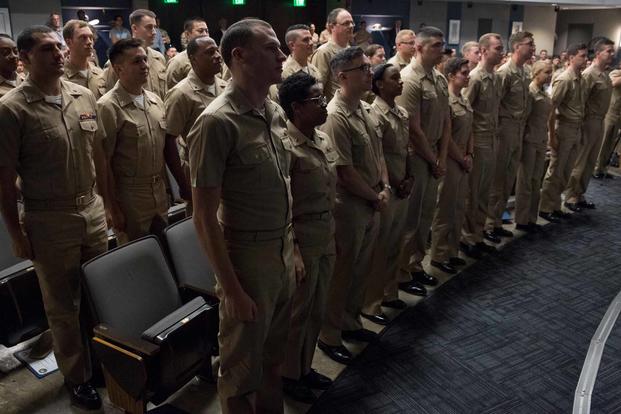Gary Anderson is a retired Marine Corps colonel with considerable command experience, and is the author of "Beyond Mahan: A Proposal for a U.S. Naval Strategy in the Twenty-First Century."
The opinions expressed in this op-ed are those of the author and do not necessarily reflect the views of Military.com. If you would like to submit your own commentary, please send your article to opinions@military.com for consideration.
America's Navy has faced tough leadership challenges of late, ranging from suicide to shipboard sabotage to training related accidents. Although ships' captains are responsible for everything that happens or fails to happen aboard, they often don't get much help from below in the leadership department.
In the Marine Corps and the Army, regimental and battalion commanders have platoon and company commanders below them to absorb many of the lower-level leadership challenges. They catch many problems with individuals, such as interpersonal disputes, troops with problems at home, and disconnects within groups, before they become major command issues. Subordinate commanders have the discretion to administer minor punishments to correct behavior before they come to the attention of a lieutenant colonel or colonel.
The Navy doesn't empower midlevel officers in that way.
Aboard Navy ships, division officers in charge of areas such as engineering, communications and gunnery are essentially considered staff officers and managers, but they are not responsible for everything their subordinates do or fail to do. If the guns do not fire or the engines are not running properly, the division officer is accountable -- not so much in the case of sailors who fail to show up for duty on time, commit minor insubordination or get into brawls in local bars.
Most of this type of discipline -- short of court-martial or nonjudicial punishment -- is left to chief petty officers, which leaves a lot of variability based on personality. That means simmering personnel and personal issues are often missed or buried until they become a major incident. The captain may have had no idea of such a problem until it lands in his lap.
There is a top-down issue, as well. Most Navy officers do not have any command experience until they take over a destroyer, nuclear submarine or aircraft squadron at the O-5 (commander) level. There are exceptions, such as small boat squadrons and smaller craft such as minesweepers where more junior officers are given command, but the challenge is largely akin to going from a college baseball team to the major leagues without a stint in the minors. Some can manage it, but others cannot.
A lieutenant colonel (O-5) in the Army or Marine Corps has likely had several platoons and at least one company under his or her belt before taking over a battalion of up to a thousand troops. If there are major problems in leadership or self-confidence in individual officers, they are generally identified or corrected before the opportunity for major command occurs.
Sociopaths, chronic incompetents and "me firsters" will usually surface once they are made totally responsible for the performance and morale of even a few dozen subordinates. A fine tactician who drives most of his soldiers over the hill through petty tyranny will likely not survive to command a battalion or regiment.
The Navy lacks such winnowing capability. A ship's executive officer (XO) understudies the captain and screens disciplinary actions, but he is still a staff officer.
To be successful, a platoon commander in the Army or Marine Corps learns to spot personnel conflicts in his squads. He can move personnel around to resolve them before they degrade the unit's performance. If a recruit who has just joined the unit from boot camp is having problems adjusting, he can be counseled and mentored by the lieutenant and his platoon sergeant.
Command styles can be tried and adjusted with experience. If the problem becomes chronic, the soldier or Marine can be referred for professional treatment before turning to self-harm. Platoons with chronic leadership problems quickly come to the attention of the company commander; the leader of the unit can be counseled, and improvement -- or lack thereof -- monitored as needed. Those who simply cannot hack the rigors of command are removed and replaced by those who can. This sometimes happens in the Navy, but the process is disjointed and not formalized.
The Navy should consider making division leadership a command billet. It would make such officers not only responsible for the technical running of their assigned area of responsibility but for the well-being, morale and discipline of the sailors in their divisions. They would have Article 15 disciplinary responsibilities like those of company commanders in the Army and Marine Corps. It would not detract from the captain's overall responsibility for the ship and its crew, but it would give the skipper a stronger leadership infrastructure to assist him or her in identifying personnel problems earlier and somewhat lessening the burden of command. It also would give junior officers intermediate command experience.
Not everyone can command, and many talented officers do not want command. There are a wide variety of jobs in the Navy and the other services where officers can attain flag rank without having commanded and, frankly, these should be expanded. Intelligence, logistics, cyber operations and public affairs are just a few of the specialties that benefit from allowing such experts to excel and advance without the distraction of being forced into a command slot for which they may not be suited.
Such a reform would cost literally nothing and allow the service to identify its future Halseys and Nimitzes early, while weeding out those who fail as leaders.














